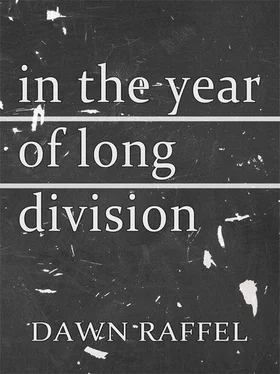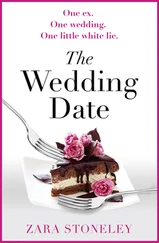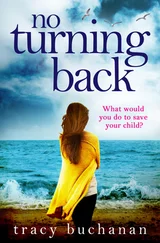“Who?” my sister said.
“Someone has entered the cupboards,” Mother said.
“Then speak for yourself,” C said.
Head bowed, in whispers, faint, through screen, I would confess to Mr. M, mourning his garden.
“What do you have to say?” Mother said.
I did not sleep.
C, I think, must not have slept. “Go away,” she said.
There were the sounds of our unsound nights.
There was the question the mothers had for Mother: What had Mother lent?
IN the night, our street, our houses vanished. Whole, lost. One by one, two and three; and three of us, there would be three of us, nightly moving, shut of our houses, out of our tents — nights, nights, nights. A lone seam, milky, rising, coming as if from an unseen flue — we would see it rise. We would let it lead us, two abreast and one behind, and one night, one of us forcibly piggied at a window. One shriek. Four arms, four legs, two heads — nights, nights — unable to look in the face of the other: That was us. All there was was this: the noise of our nights — a whimper in a torn-through garden, snores, a moan — love, I think — of a woman or a man, a father, anyone’s father; our rent breath, a crying, pallid and rising, almost a keening, rising, the falling and the falling of our feet.
SOMETHING IS MISSING OF YOURS
THEY are burning the leaves out back, at the edge of the yard — far back enough for the father’s peace of mind from the house. The father, of course, is the one who is taking care of the burning. The daughter, having done her share of raking and bunching, is standing aside in the shrubby bramble, hands slid into her loden pockets, watching the house for signs.
“Smell,” the father says.
“I’m cold,” the daughter says. “I can see my breath.”
“That’s impossible. Look at these reds,” the father says. “Elm leaves maybe. Maple.”
“I have a burr in my shoe,” the daughter says.
The father jiggers the leaves with a length of branch, scaring up cindery flecks. “You’re sounding just like her,” the father says. “Really. You know what that’s liable to spell?”
“No, I don’t,” the daughter says.
“Then too bad for you,” the father says.
THE mother is lying in bed smoking filterless cigarettes filched from the father’s jacket pocket. A windfall of linens — wash towels, kerchiefs, lingerie — is scattered around her, wrung out, reused. She has twist-top bottles the color of some kind of syrup in bed with her, too, and same-colored stains of it, a few spoons needing washing, a mateless sock, a thermometer, which does not work, a butane lighter, a wristwatch — scratched — pumpkin seeds, makeup, the crusts of toast.
“Tell me,” the mother says to the daughter, who stands by her bedside. “What time is it? What were you all that time up to together back out there?”
“Just upkeep is all,” the daughter says.
“Save it,” the mother says. “Hand me that lipstick.”
“Where?” the daughter says.
The mother blows a smoke ring. “Make a wish,” she says. “Some color becomes me, your father said. Once.”
“It would,” the daughter says. “Now.”
“If what?” the mother says.
“Beats me,” the daughter says. “Anyway, suppertime’s coming up soon.”
“Again?” the mother says.
NOTHING is out in the yard except for what rightly, by nature, belongs there. The usual stirrings — flappings, flickering things. A slight shudder of brier. A rumor of frost. Tall grasses and weedy things. Garden and yard tools dirtied with earth. There are scootings and squirrelings. Whiffings. Hoots. Cool acorns, pine cones, thistle and fluff. Things that drift down slowly, softly. Scratchings. Markings. Tender signs — if one is looking to see them.
“HE says to stop raiding his pockets,” the daughter says to the mother, who taps an ash off on the wadded bedding by way of response. “Do you know what you’re doing is asking for trouble?”
“I know what I know,” the mother says.
The daughter turns and looks out the bedroom window.
“Do you?” the mother says.
“Couldn’t you pick this place up?” the daughter says.
“What kind of an answer is that?” the mother says.
THE daughter says to the father, “It’s raining — and that’s not the half of it, either.”
THE daughter believes that the father often enters her room at times when she is not there, and that he opens her dresser drawers. She imagines the father handling fabric, possibly running a finger the delicate length of a seam.
She is of the impression that sooner or later the father slips himself into her bed, but not to rest. Instead, she envisions the father regarding the ceiling above his head, maybe taking note of the slightest beginnings of water damage there.
THE daughter can never seem to sleep in her bed at night. Night after night, she lies alert, aware of the bedclothes touching her skin. Looking up, in the light of the moon coming in through the parted window lace, what the daughter sees on the ceiling is next to nothing.
THE father has followed the daughter into the kitchen, where she is setting the kettle down on the range flame.
“There’s work needs doing outside,” the father says.
“Maybe later,” the daughter says.
“When?” the father says.
The daughter yawns. “Search me,” she says. “I’m all the time so sleepy.”
“Tea is the ticket,” the father says.
“I wonder,” the daughter says, “why would a person talk in their sleep.”
“Plenty of sugar,” the father says. “And milk.”
The daughter opens a carton and sniffs. “God, is this evil,” she says.
“Who do you know who talks in their sleep?” the father says, shutting the flame off.
“Nobody,” the daughter says. “That’s who.”
THE daughter has fallen asleep in the mother’s bed, with her arms around the mother, and with most of the mother’s soiled belongings pushed over to one side.
THE daughter is out behind the house, in the place where the ground is scarred. The air is crisp and still, and there is just the slightest motion of a curtain as the daughter tends to burning what she is burning one by one.
IN THE YEAR OF LONG DIVISION
THEY were always breaking bones across the street. Knuckled and fisted, those boys had bruised voices that traveled, raised. We could hear them in the alley in the night behind our house, the curtains swelling in a room still shared. We lay in bed awake and listened. Brothers, they did it to themselves, our mother said, to each other, she supposed; a leg, a crushed elbow, knees — deserved. We were female in our house. We cracked the windows for air, my sister said, for better winter breathing.
Days, we saw those boys in the sun, in snow, pants slit up the seams; the quick glint of a splinted finger, foam. Our neighbors were whistling, snow-slinging, crutching. Their socks were rough and thermal. Wool, maroon — the grimed red of a scab where a shoe was gone. We thought the casts were dyed. We saw wobbles and scribbles. Names were named in ink.
At first, we could not tell those boys apart or, in the holler and tilt of them in motion, just how many of them there really were. We were strangers to their injuries. Girls. We dressed in mostly purses and dresses, straps flat and narrow down the hollows of our shoulders, straight, neat — not a collarbone banged, not a square patch of bandage at an eye to keep the eye tight shut.
The boys’ mother was missing a breast, our mother said. She said, “Those boys are good for trouble, fatherless boys like those. Look out.”
We looked out from indoors. Nose-to-glass, we looked, fogging, we looked, through the damp of our exhalations, downstairs, upstairs, piggyback — we saw scenes through see-through curtains, a shadow boxing with a shade, something bubbled, tubside — every which way we could find to look, we did; one and the other, and once — or was it twice? — both, in a wash, shriveled and skin-shedding, soaked in looks of bathroom-window-frosted boy. Rings ringed the tub. We left smudges in our wake of who knew what.
Читать дальше












